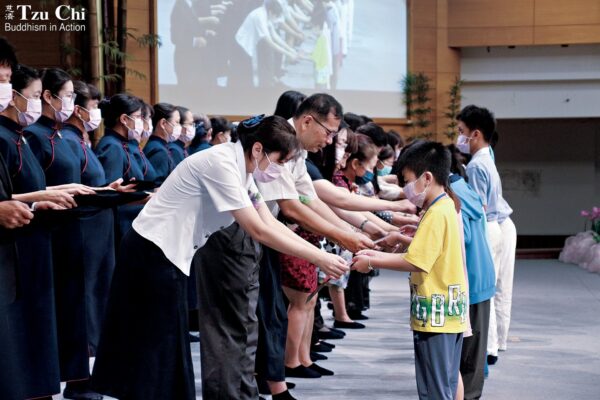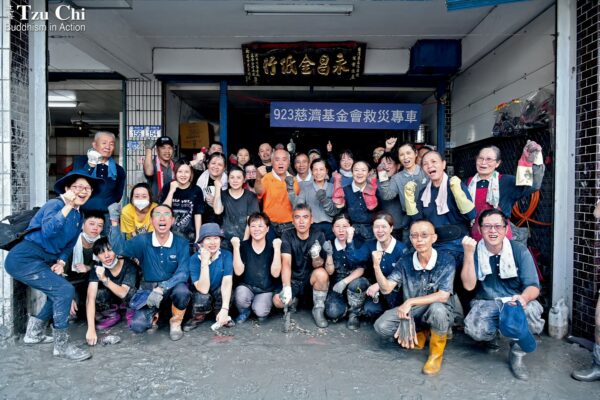By Yeh Tzu-hao
Abridged and translated by Wu Hsiao-ting
Photos by Hsiao Yiu-hwa
Tzu Chi volunteers in Taiwan were happy when the pandemic eased after a surge in COVID cases last summer and allowed their recycling work to return to normal. But increased amounts of garbage—spurred on by e-commerce and takeout food services—became a source of worry.
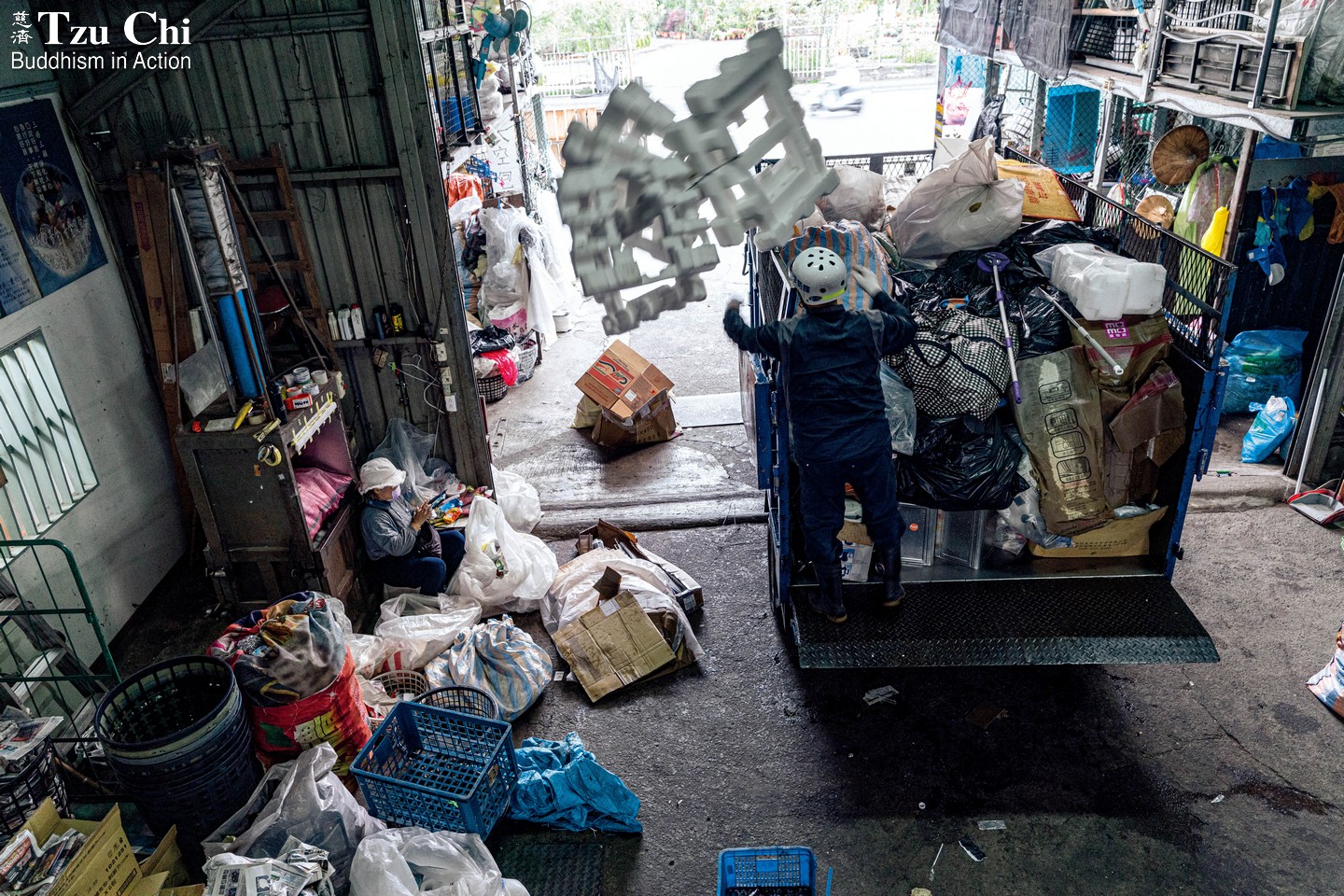
A volunteer unloads a truck at a recycling station in Muzha, Taipei, in December 2021.
Early one rainy winter morning, Yang Pan Chun-hui (楊潘春慧), 83, boarded a bus headed down the mountain to a Tzu Chi recycling station in Muzha, Taipei, northern Taiwan. When she arrived, she was cheerfully greeted by the people already there. “Hui, here you are!” they exclaimed as she walked into the station.
She had always enjoyed serving at the station, but cherished her time there even more now, after a sudden spike of COVID-19 cases in Taiwan last year caused Tzu Chi recycling stations across the island to close for more than two months. She knew what it was like to be at loose ends, and it was most certainly no fun.
Her work at the station that day was to remove the caps from plastic bottles. Before long, the small bucket at her feet was full of caps of all sorts of colors. Though she wasn’t making any money for her services at the station, she was as happy as could be. “For me, sitting idly at home is hard work,” said the octogenarian. “Having work to do is a blessing.”
Unprecedented measures
The temporary closure of Tzu Chi recycling stations from mid-May to late July in 2021 was an unprecedented event. Since the foundation started recycling work in 1990, its stations had never stopping taking in recyclables, not even during the SARS epidemic of 2003.
“We made the decision to close not just to protect our volunteers, but for the safety of society as a whole,” said Zhang Han-jun (張涵鈞), head of Tzu Chi’s Section for the Promotion and Development of Environmental Protection Work. He explained that the virus that caused COVID-19 could remain active for as long as three days on the surface of recycled items. One couldn’t be too careful.
The doors to the stations were locked and notices put up turning away all recyclables during the closure, but people continued to take bag after bag of recycling to Tzu Chi recycling stations. This occurred even in Hualien, eastern Taiwan, where the amounts of garbage produced were comparatively small.
“At first, we posted a smaller sign asking people not to bring recyclables to us,” said volunteer Lin Cui-yun (林翠雲), of the Meilun Recycling Station in Hualien. “When that didn’t work, we put up a large banner with the same announcement, but to no avail. People said they were so used to bringing recyclables to us that they couldn’t bring themselves to take them elsewhere.” Lin recalled that even though the streets were quiet during that time, people never stopped dropping recycling at the station.
With the surge in confirmed COVID infections, Taiwan’s government had raised its COVID alert to the second highest level, level three, and capped indoor gatherings to no more than five people. Even so, Lin knew that they had to find a way to process the recyclables brought to the station so they wouldn’t end up as regular garbage. Keeping the number of helpers as low as possible, she invited another volunteer to work with her at the station. They followed instructions from Tzu Chi headquarters in Hualien and sterilized all recycling with disinfectant spray before they set to work. They ramped up personal protection against the virus too. “I always double masked,” said Lin.
Fewer people working meant more work for each person. One time, Lin took her nephew to the station to help her out. When the youngster saw the huge piles of recycling they had to sort, he instantly wailed: “Why so much? We can’t possibly finish all of it!”
“But we can’t just throw in the towel,” Lin said. “Some of the items in the piles, such as paper meal boxes, will rot and stink if we don’t process them as soon as possible and send them to the recycling merchant.”
Lin explained that due to the pandemic, the demand for food delivery had grown substantially, leading to a spike in disposable containers and utensils. One time she and a few other volunteers worked for an entire week, from six in the morning into the afternoon, just to finish processing some recyclables. It was quite a job, especially for someone like her, who was over 70.
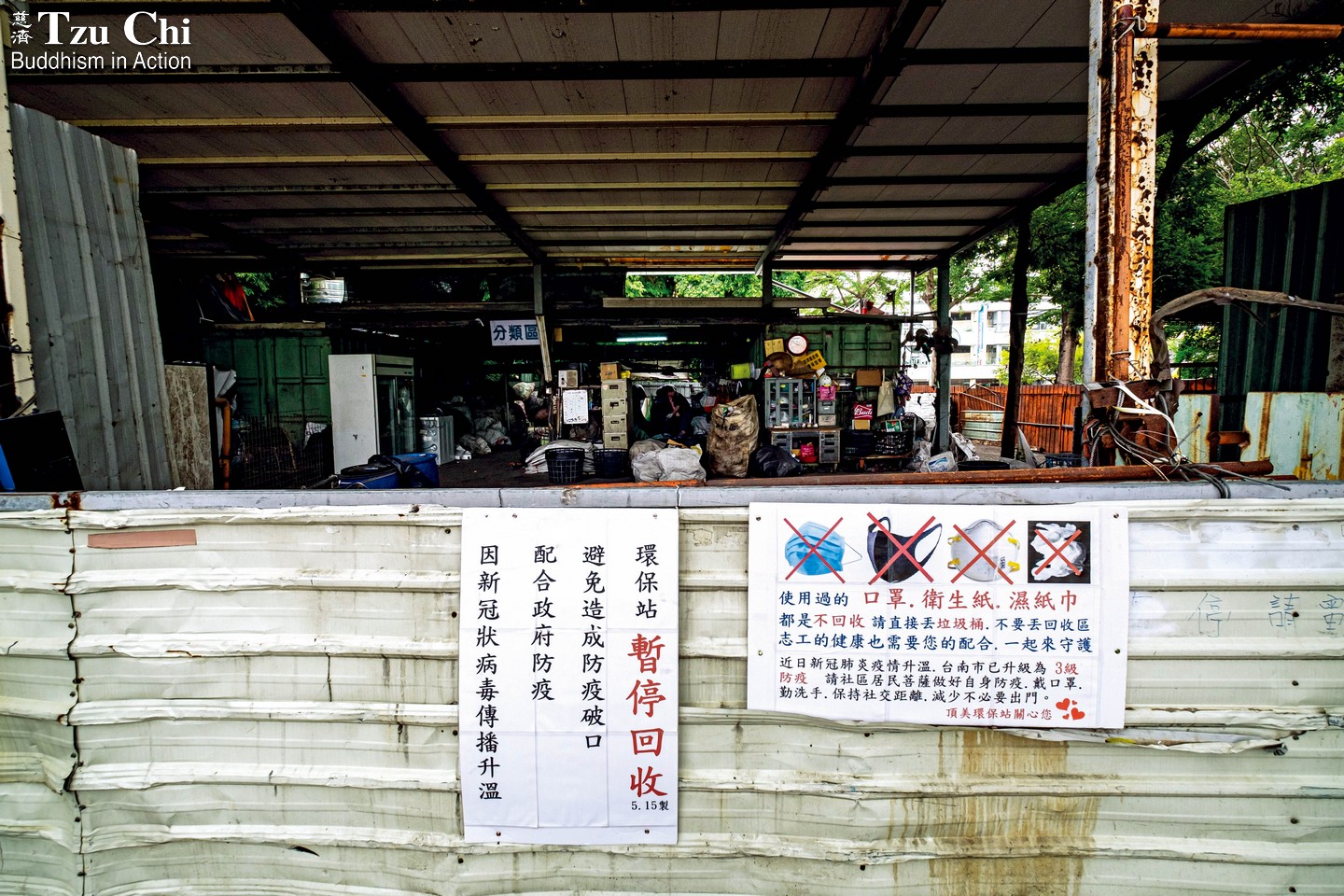
A sign (left) put up at the Dingmei Recycling Station in Tainan following a surge in COVID cases in Taiwan in mid-May 2021. It informs people that the station is temporarily turning away all recyclables.
Happy to be back in the saddle
“We worked half in fear and half in joy during that period,” said volunteer Lin Xiu-xia (林秀霞), of the Fuyang Recycling Station in Fengyuan, Taichung, central Taiwan. “We all loved to be recycling, but were afraid of the virus!” Lin added that after the COVID alert was raised to level three, she and other team leaders often called other volunteers and urged them to avoid unnecessary outings. They especially made a point to stay in touch with all the older volunteers. With the pandemic setting everyone’s nerves on edge, Lin and her fellow volunteers did everything with caution and a heightened sense of vigilance.
“The operation of our recycling station didn’t come to a complete halt,” said another volunteer, Li Mei-ying (李美櫻), “but we staggered the times for volunteers to work at the station. For example, we’d let in two or three people one day to sort plastic bags, and three or four the next to separate things by type.”
In normal times, the Fuyang station typically sees an average of 20 volunteers working there at the same time, but during the restricted time last summer, it was down to four people at the most. The capacity to handle work was lowered to one fifth of the usual level. Fortunately, the amount of recycling that ended up at the station was also greatly reduced, so the volunteers weren’t spread too thin. They even had some spare time to process a backlog of unfinished work that had been lying around for some time. “Take Brother Zhan Yi-qin [詹益欽],” Li said. “He did a good cleanout of the station, removing stuff that had been there for as long as anyone could remember.”
“My home is close to the station,” Zhan explained after putting down a bench grinder and an aluminum broom handle he had cut halfway through. “It takes me just five minutes to drive my motor scooter here. It was pretty safe for me to come and work here.” As if trying to justify his rationale for working at the station during that dangerous time, he continued: “I’d close the door as soon as I came in and work alone here. We have a lot of space here; even if there were more than one person working here at the same time, we made sure to keep it under the required limit.”
The volunteers’ strict observance of the government’s regulations was commendable, but it also meant that many older volunteers who had long served at Tzu Chi recycling stations were suddenly forced out of work. Many of them didn’t welcome the unexpected holiday.
Even if they were allowed to work at a recycling station, their family might not have agreed to let them do so. “My sons support my volunteering,” said volunteer Lai Qiu-ju (賴秋菊). “But during the level three alert period, they wouldn’t let me go to the recycling station. They said if I got infected [with COVID-19], our entire family would be forced into isolation.”
Lai said that because everyone in her family worked, she was often the only person at home during the day. Time hung heavy on her hands with nothing to do. That’s why she had jumped at the opportunity to volunteer at the Fuyang station when it opened more than four years before. She happily took two buses every day to get to the station and do her bit to help the environment. Who was to know the recycling station would close its door in mid-May? Even the buses she took to get to the station stopped running.
“Lai felt down, cooped up at home with nothing to do,” said volunteer Lin Xiu-xia, who often phoned her to check on her during that time. “She said her body had begun to ache again, and she was near the point of clinical depression.” After learning about her situation, Lin conferred with their leader and decided to let Lai come back to the station to volunteer. Lai’s sons eventually agreed to let her do so too. Thus, Lin began bringing Lai to the station on a motor scooter.
“My ‘holiday’ was thus shorter than others’,” said Lai. “I was back at work as soon as the pandemic had eased a little. My hand ached, but I forgot about my aches and pains as soon as I had work to engage me.” Lai was back to her old spirited self as soon as she was back at the station.
“Our volunteers always tell me they are wimps at home but whirlwinds at the station,” said volunteer Lin, her eyes crinkling with a smile.
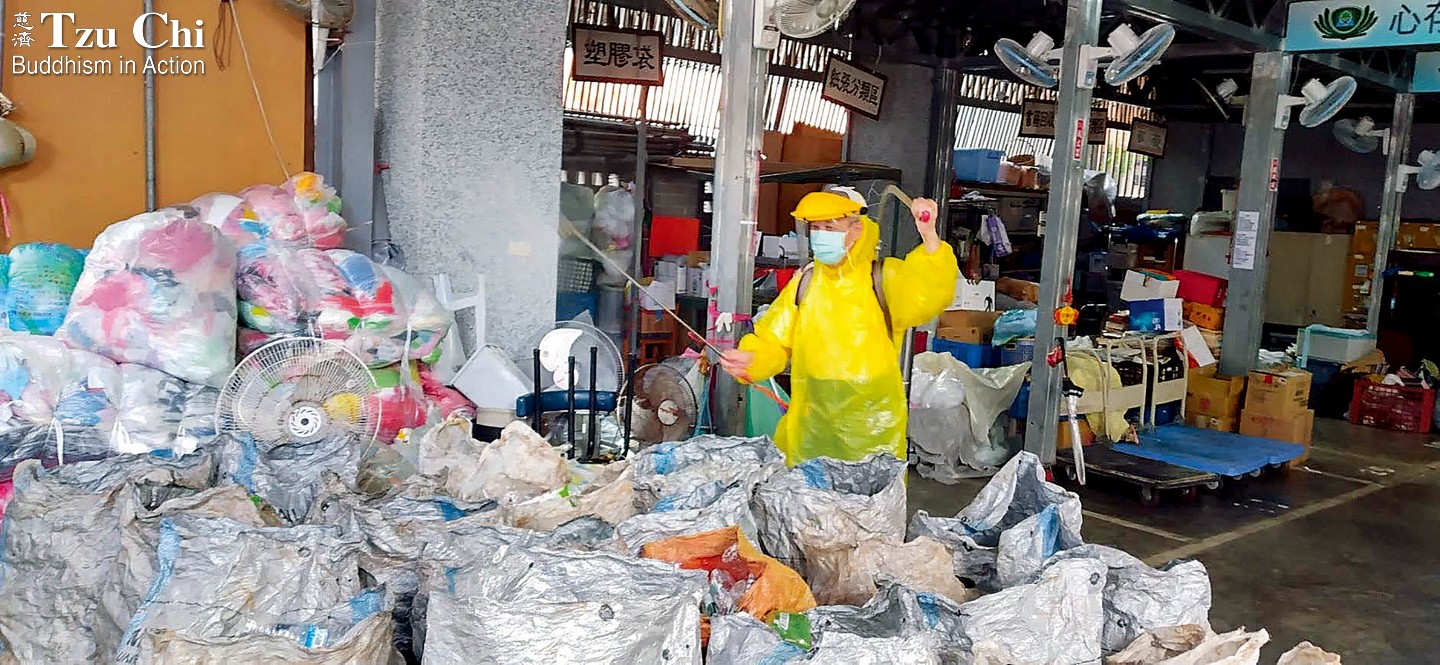
A recycling station being sterilized after the COVID alert was raised to level three in Taiwan last year Courtesy of the Section for the Promotion and Development of Environmental Protection Work, Tzu Chi Foundation
Temporary collection points
With all sorts of pandemic restrictions in place, volunteers tried all sorts of ways to keep their work going while following the regulations. The Renhe Recycling Station in Tainan, southern Taiwan, for example, set up eight temporary collection points at people’s homes to cope.
Volunteer Liu Yu-wen (劉玉文), who is in charge of the Renhe station, said that he closed the station as soon as the level three alert was announced. He even changed the lock on the front door to prevent the volunteers who had keys to the station from entering. But after that, his cell phone just wouldn’t stop ringing.
“People kept calling me to complain that their homes were cluttered with recyclables,” Liu said. “They insisted on giving their recycling to Tzu Chi. Some even dropped their recycling off at the door of our station. That’s why we eventually reached an agreement with some volunteers and people of the general public to set up eight collection points.”
Liu explained how the temporary collection points worked, which was different from a typical collection point. Usually, volunteers collect mixed recyclable garbage at a collection point and transport it to a recycling station to be sorted. But people who took their recyclables to the temporary points needed to first clean and thoroughly separate the recyclables by type. That pre-processing allowed volunteers to pick up the recyclables and deliver them directly to recycling merchants, thus preventing the gathering of crowds.
Ms. Lin, over 80, was one of those who took part in this temporary arrangement. She had been collecting recyclables for Tzu Chi for over 20 years. She had begun to suffer from severe insomnia when she had grown older, and would often wake up in the middle of the night and not be able to fall back asleep. With her family sound asleep and no one to spend time with her, she took to visiting food stalls that catered to late-night customers to collect recyclables. She’d rinse and sort her recycling at home before volunteers dropped by to take it away. Accommodating her schedule, volunteer Liu Yu-wen always sent out a truck to her home early every morning to pick up her recyclables.
This arrangement worked perfectly until the level three COVID alert was issued. Considering that older people were more susceptible to the coronavirus, Liu advised Ms. Lin to take a timeout from her recycling work. Her children also pleaded with her not to go out to collect recyclables. But without her recycling work, her life seemed to lose its focus. “She didn’t like to watch TV,” Liu explained, “and there was nothing else to occupy her time at home. After staring at the ceiling for three days, she started going out to collect recyclables again and even took them to our station herself.”
That’s why Liu started sending a truck to her home three times a week during the level three alert period to pick up her recyclables. The truck came back every time with a full load. The volunteers who did the pickups always reminded her to take precautions against COVID when she went out for her recycling work. Fortunately, the pandemic alert was lowered to level two in late July 2021, allowing all Tzu Chi recycling stations, including the Renhe station, to resume their normal operations. Volunteers were thus able to return to their old routines.
Even so, the pandemic hadn’t ended yet, and every station still needed to take necessary preventive measures. “Before we closed our station last year,” Liu said, “we asked a cleaning company to sterilize our entire station with disinfecting sprayers. Now we urge our volunteers to don protective gear, use sanitizers, and maintain social distance when they work at the station. We also sterilize our station on our own every week with disinfectant spray.” He stressed that they still went about everything with caution.
After the wave of cases last year, volunteers cherished every opportunity to serve even more. Even though they do not make a single penny for their work, the joy they derive from it makes them feel more than adequately rewarded. Taking due care to protect themselves, they cheerfully continue to reclaim reusable resources and minimize damage to our beautiful Earth.
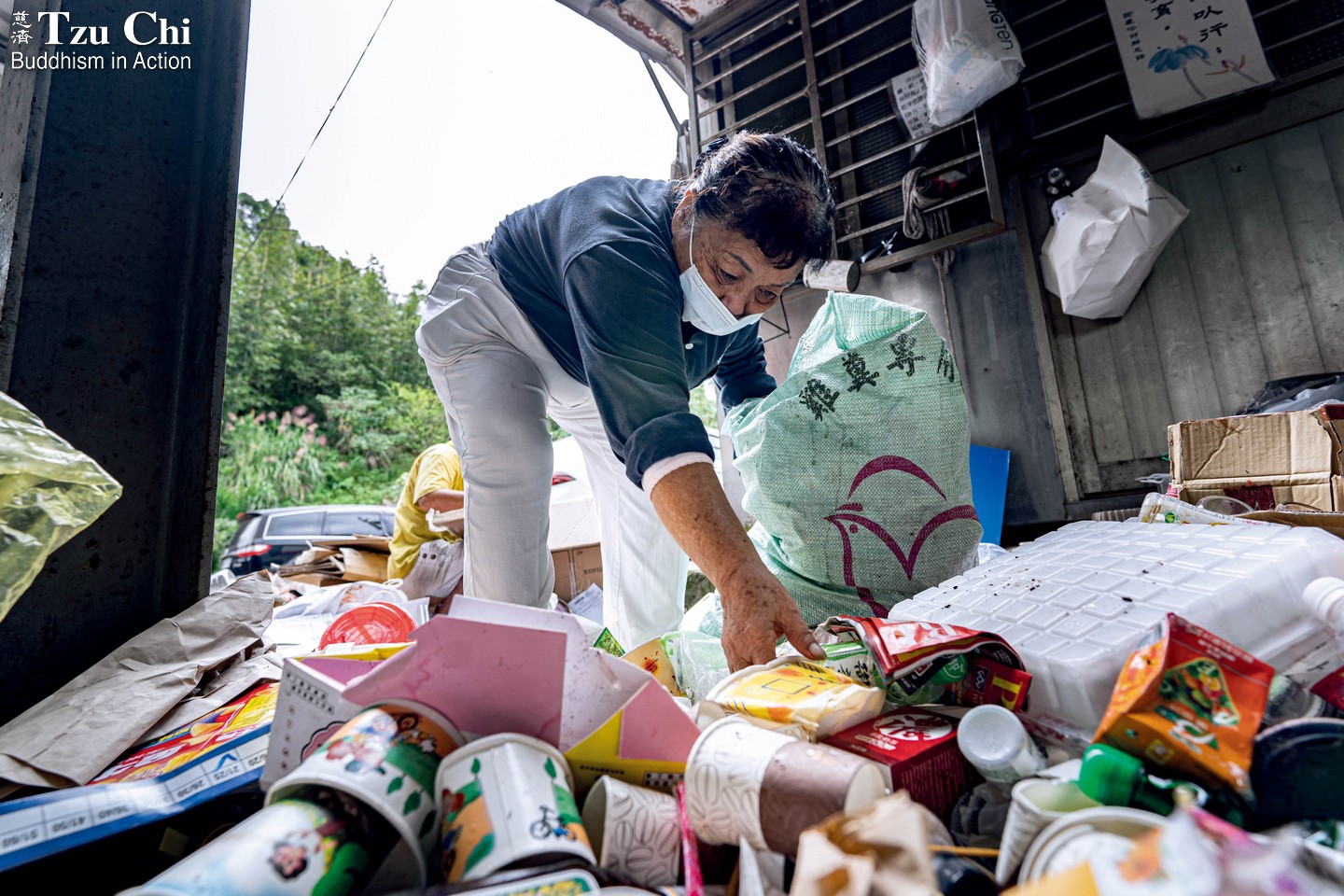
A volunteer sorts through a pile of recyclables. Paper food containers make up a large part of the recycling.

